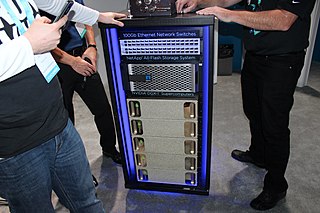Related Research Articles

A quantum computer is a computer that exploits quantum mechanical phenomena. On small scales, physical matter exhibits properties of both particles and waves, and quantum computing leverages this behavior using specialized hardware. Classical physics cannot explain the operation of these quantum devices, and a scalable quantum computer could perform some calculations exponentially faster than any modern "classical" computer. In particular, a large-scale quantum computer could break widely used encryption schemes and aid physicists in performing physical simulations; however, the current state of the art is largely experimental and impractical, with several obstacles to useful applications.

In quantum computing, a qubit or quantum bit is a basic unit of quantum information—the quantum version of the classic binary bit physically realized with a two-state device. A qubit is a two-state quantum-mechanical system, one of the simplest quantum systems displaying the peculiarity of quantum mechanics. Examples include the spin of the electron in which the two levels can be taken as spin up and spin down; or the polarization of a single photon in which the two spin states can also be measured as horizontal and vertical linear polarization. In a classical system, a bit would have to be in one state or the other. However, quantum mechanics allows the qubit to be in a coherent superposition of multiple states simultaneously, a property that is fundamental to quantum mechanics and quantum computing.
This is a timeline of quantum computing.

High technology, also known as advanced technology or exotechnology, is technology that is at the cutting edge: the highest form of technology available. It can be defined as either the most complex or the newest technology on the market. The opposite of high tech is low technology, referring to simple, often traditional or mechanical technology; for example, a slide rule is a low-tech calculating device. When high tech becomes old, it becomes low tech, for example vacuum tube electronics. Further, high tech is related to the concept of mid-tech, that is a balance between the two opposite extreme qualities of low-tech and high tech. Mid-tech could be understood as an inclusive middle that combines the efficiency and versatility of digital/automated technology with low-tech's potential for autonomy and resilience.
Superconducting quantum computing is a branch of solid state quantum computing that implements superconducting electronic circuits using superconducting qubits as artificial atoms, or quantum dots. For superconducting qubits, the two logic states are the ground state and the excited state, denoted respectively. Research in superconducting quantum computing is conducted by companies such as Google, IBM, IMEC, BBN Technologies, Rigetti, and Intel. Many recently developed QPUs use superconducting architecture.

D-Wave Quantum Systems Inc. is a Canadian quantum computing company, based in Burnaby, British Columbia. D-Wave claims to be the world's first company to sell computers that exploit quantum effects in their operation. D-Wave's early customers include Lockheed Martin, the University of Southern California, Google/NASA, and Los Alamos National Lab.

Silicon Wadi is a region in Israel that serves as one of the global centres for advanced technology. It spans the Israeli coastal plain, and is cited as among the reasons why the country has become known as the world's "start-up nation". The highest concentrations of high-tech industry in the region can be found around Tel Aviv, including small clusters around the cities of Raʽanana, Petah Tikva, Herzliya, Netanya, Rehovot, and Ness Ziona. Additional clusters of high-tech industry can be found in Haifa and Caesarea. More recent high-tech establishments have been raised in cities such as Jerusalem and Beersheba, in towns such as Yokneam Illit, and in Airport City. Israel has the third highest number of startups by region and the highest rate of startups per capita in the world.
A quantum bus is a device which can be used to store or transfer information between independent qubits in a quantum computer, or combine two qubits into a superposition. It is the quantum analog of a classical bus.
The DiVincenzo criteria are conditions necessary for constructing a quantum computer, conditions proposed in 2000 by the theoretical physicist David P. DiVincenzo, as being those necessary to construct such a computer—a computer first proposed by mathematician Yuri Manin, in 1980, and physicist Richard Feynman, in 1982—as a means to efficiently simulate quantum systems, such as in solving the quantum many-body problem.

The Nvidia DGX represents a series of servers and workstations designed by Nvidia, primarily geared towards enhancing deep learning applications through the use of general-purpose computing on graphics processing units (GPGPU). These systems typically come in a rackmount format featuring high-performance x86 server CPUs on the motherboard.

Yasunobu Nakamura (中村 泰信 Nakamura Yasunobu) is a Japanese physicist. He is a professor at the University of Tokyo's Research Center for Advanced Science and Technology (RCAST) and the Principal Investigator of the Superconducting Quantum Electronics Research Group (SQERG) at the Center for Emergent Matter Science (CEMS) within RIKEN. He has contributed primarily to the area of quantum information science, particularly in superconducting quantum computing and hybrid quantum systems.
IBM Quantum Platform is an online platform allowing public and premium access to cloud-based quantum computing services provided by IBM. This includes access to a set of IBM's prototype quantum processors, a set of tutorials on quantum computation, and access to an interactive textbook. As of February 2021, there are over 20 devices on the service, six of which are freely available for the public. This service can be used to run algorithms and experiments, and explore tutorials and simulations around what might be possible with quantum computing.

Vegan Friendly, formerly the Association for the Vegan Future, is an Israeli organization founded in September 2012 by Omri Paz, an advocate of veganism and animal rights.
Quil is a quantum instruction set architecture that first introduced a shared quantum/classical memory model. It was introduced by Robert Smith, Michael Curtis, and William Zeng in A Practical Quantum Instruction Set Architecture. Many quantum algorithms require a shared memory architecture. Quil is being developed for the superconducting quantum processors developed by Rigetti Computing through the Forest quantum programming API. A Python library called pyQuil was introduced to develop Quil programs with higher level constructs. A Quil backend is also supported by other quantum programming environments.
In quantum computing, a qubit is a unit of information analogous to a bit in classical computing, but it is affected by quantum mechanical properties such as superposition and entanglement which allow qubits to be in some ways more powerful than classical bits for some tasks. Qubits are used in quantum circuits and quantum algorithms composed of quantum logic gates to solve computational problems, where they are used for input/output and intermediate computations.
In quantum computing, quantum memory is the quantum-mechanical version of ordinary computer memory. Whereas ordinary memory stores information as binary states, quantum memory stores a quantum state for later retrieval. These states hold useful computational information known as qubits. Unlike the classical memory of everyday computers, the states stored in quantum memory can be in a quantum superposition, giving much more practical flexibility in quantum algorithms than classical information storage.
Quantinuum is a quantum computing company formed by the merger of Cambridge Quantum and Honeywell Quantum Solutions. The company's H-Series trapped-ion quantum computers set the highest quantum volume to date of 1,048,576 in April 2024. This architecture supports all-to-all qubit connectivity, allowing entangled states to be created between all qubits, and enables a high fidelity of quantum states.

Sycamore is a transmon superconducting quantum processor created by Google's Artificial Intelligence division. It has 53 qubits.
This glossary of quantum computing is a list of definitions of terms and concepts used in quantum computing, its sub-disciplines, and related fields.
References
- 1 2 3 4 5 "Quantum Machines launches Israeli Quantum Computing Center". ctech. 2024-06-17. Retrieved 2024-06-22.
- ↑ "Quantum Machines Establishes Cutting-Edge Israeli Quantum Computing Center". quantumzeitgeist.com. 2024-06-17. Retrieved 2024-06-22.
- ↑ https://www.datacenterdynamics.com/en/news/quantum-machines-opens-israeli-quantum-computing-center-housing-three-systems/
- ↑ Leichman, Abigail Klein (2022-12-29). "Is Israel about to become a leader in quantum computing?". ISRAEL21c. Retrieved 2024-06-22.
- 1 2 3 4 5 6 7 Wrobel, Sharon (18 June 2024). "Amid war, Israel opens R&D center to put the country on the map of quantum computing".
- 1 2 3 4 Quantum Machines opens Israeli quantum computing center housing three systems, June 17 2024, Charlotte Trueman, datacenterdynamicshttps://www.datacenterdynamics.com/en/news/quantum-machines-opens-israeli-quantum-computing-center-housing-three-systems/
- ↑ Leichman, Abigail Klein (2022-12-29). "Is Israel about to become a leader in quantum computing?". ISRAEL21c. Retrieved 2024-06-22.
- 1 2 Wrobel, Sharon (18 June 2024). "Amid war, Israel opens R&D center to put the country on the map of quantum computing".
- 1 2 Grossman, Ariel (2023-01-01). "$32.5M To Develop Quantum Computing In Israel". NoCamels. Retrieved 2024-06-22.
- 1 2 "Quantum Machines launches Israeli Quantum Computing Center". ctech. 2024-06-17. Retrieved 2024-06-22.
This article needs additional or more specific categories .(June 2024) |